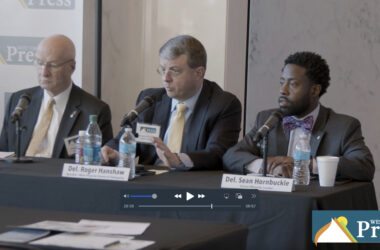PARKERSBURG, W.Va. — A complaint accusing four City Council members of violating the state’s open meetings law was dismissed Thursday, but the councilwoman who filed plans to appeal the decision to the West Virginia Supreme Court.
Wood County Circuit Judge J.D. Beane granted a motion to dismiss Councilman Roger Brown from the suit, with which the attorney for Councilwoman Nancy Wilcox, the plaintiff, agreed. Minutes later, Beane dismissed the full complaint against Council President J.R. Carpenter, Councilwoman Kim Coram and Councilman Mike Reynolds as well.
Wilcox filed the complaint in August, alleging Brown, Carpenter, Coram and Reynolds determined the scope of a financial review and agreed to engage the services of local accounting firm Perry and Associates outside of a properly noticed public meeting.
The defendants argued that they did not make any decisions when they met with a representative of the company to discuss the procedure, and their attorneys pointed out that the scope and engagement were voted upon at a special council meeting on June 30.
Beane cited the latter argument in granting a motion to dismiss by Walt Auvil, the attorney for Carpenter, Coram and Reynolds.
“The alleged wrongdoing complained of has been relieved,” he said.
Wilcox’s attorney, William Summers, asked that his objection to the dismissal against Carpenter, Coram and Reynolds be noted in the record.
“We don’t believe in that interpretation,” he said Thursday afternoon, after stating his intent to appeal. “We’ll be addressing our specific grounds in the petition.”
The motion to dismiss filed by Brown’s attorney, Roger Hanshaw, notes his client is not a member of the Finance Committee, so even if the law was violated by a quorum of the group – which Carpenter, Coram and Reynolds constitute – meeting with a Perry representative, Brown could not have been part of the violation.
Summers said taking the case to West Virginia’s highest court could set a statewide legal precedent.
“It sort of gives it a larger reach than it would be being a local issue,” he said.
In objecting to the dismissal against Carpenter, Coram and Reynolds, Summers said he thought the discovery process would have started before Beane made the ruling.
The judge said that might have happened if the hearing was taking place prior to the June 30 meeting in which council approved, on a pair of 5-4 votes with the defendants in the majority and Wilcox among the opposed, the scope of the review and the hiring of Perry and Associates to do it. Auvil and Hanshaw argued the proper remedy for a violation, if one occurred, was to have the matter reconsidered in a properly noticed meeting.
“Any action from the (previous) alleged meeting is moot,” Beane said.
Brown, Carpenter, Coram and Reynolds have acknowledged meeting with a representative of Perry and Associates in June, but said they did not make any decisions during that meeting. Carpenter signed a letter of engagement with the company on June 25 and said changes in the scope of what had been discussed in a March 10 Finance Committee meeting were made after separate conversations among the five council members who voted for it.
The June 30 meeting was called by Carpenter after City Attorney Joe Santer said the matters needed to be voted on by the full council.
“I think we did make an error, and Mr. Santer said we need to take it in front of council,” Carpenter said Thursday after the hearing. “So we had a special meeting and voted as council as a whole.”
Reynolds said the group could not have made a decision without the full council, since the four of them do not constitute a quorum.
“I’ve always felt like Mrs. Wilcox’s frivolous lawsuit was really just an attempt to discredit the four of us without merit,” he said.
Wilcox disagreed.
“I just wanted them to obey the law,” she said.
After the hearing, Auvil said he didn’t know if the state’s open meetings law had been violated, and noted that was not the matter on which Beane ruled. The purpose of the law, Auvil said, is to get public officials to conduct business properly and openly.
“Having somebody get sued because they were called on the carpet and they fixed it is all stick and no carrot,” Auvil said.
Informed of Summers’ intent to appeal, Auvil said, “That’s their right.”
To read more from the Parkersburg News and Sentinel, subscribe here.





